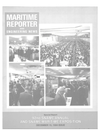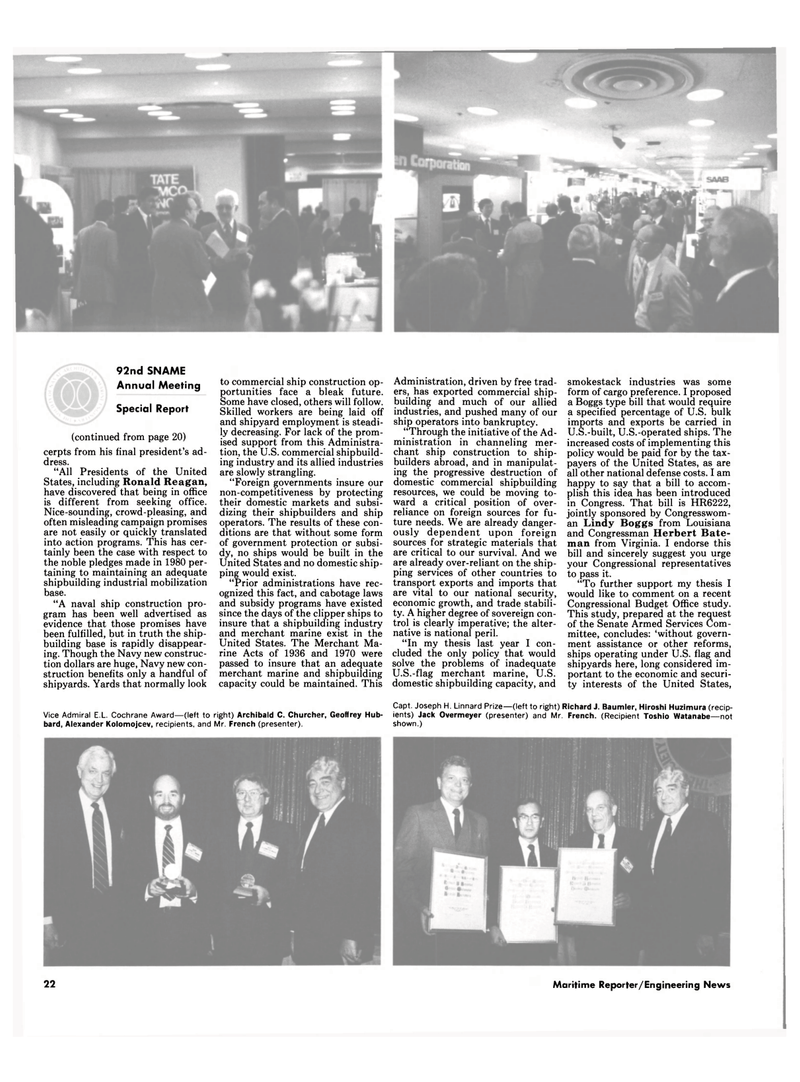
Page 20: of Maritime Reporter Magazine (December 15, 1984)
Read this page in Pdf, Flash or Html5 edition of December 15, 1984 Maritime Reporter Magazine
92nd SNAME
Annual Meeting
Special Report (continued from page 20) cerpts from his final president's ad- dress. "All Presidents of the United
States, including Ronald Reagan, have discovered that being in office is different from seeking office.
Nice-sounding, crowd-pleasing, and often misleading campaign promises are not easily or quickly translated into action programs. This has cer- tainly been the case with respect to the noble pledges made in 1980 per- taining to maintaining an adequate shipbuilding industrial mobilization base. "A naval ship construction pro- gram has been well advertised as evidence that those promises have been fulfilled, but in truth the ship- building base is rapidly disappear- ing. Though the Navy new construc- tion dollars are huge, Navy new con- struction benefits only a handful of shipyards. Yards that normally look to commercial ship construction op- portunities face a bleak future.
Some have closed, others will follow.
Skilled workers are being laid off and shipyard employment is steadi- ly decreasing. For lack of the prom- ised support from this Administra- tion, the U.S. commercial shipbuild- ing industry and its allied industries are slowly strangling. "Foreign governments insure our non-competitiveness by protecting their domestic markets and subsi- dizing their shipbuilders and ship operators. The results of these con- ditions are that without some form of government protection or subsi- dy, no ships would be built in the
United States and no domestic ship- ping would exist. "Prior administrations have rec- ognized this fact, and cabotage laws and subsidy programs have existed since the days of the clipper ships to insure that a shipbuilding industry and merchant marine exist in the
United States. The Merchant Ma- rine Acts of 1936 and 1970 were passed to insure that an adequate merchant marine and shipbuilding capacity could be maintained. This
Administration, driven by free trad- ers, has exported commercial ship- building and much of our allied industries, and pushed many of our ship operators into bankruptcy. "Through the initiative of the Ad- ministration in channeling mer- chant ship construction to ship- builders abroad, and in manipulat- ing the progressive destruction of domestic commercial shipbuilding resources, we could be moving to- ward a critical position of over- reliance on foreign sources for fu- ture needs. We are already danger- ously dependent upon foreign sources for strategic materials that are critical to our survival. And we are already over-reliant on the ship- ping services of other countries to transport exports and imports that are vital to our national security, economic growth, and trade stabili- ty. A higher degree of sovereign con- trol is clearly imperative; the alter- native is national peril. "In my thesis last year I con- cluded the only policy that would solve the problems of inadequate
U.S.-flag merchant marine, U.S. domestic shipbuilding capacity, and smokestack industries was some form of cargo preference. I proposed a Boggs type bill that would require a specified percentage of U.S. bulk imports and exports be carried in
U.S.-built, U.S.-operated ships. The increased costs of implementing this policy would be paid for by the tax- payers of the United States, as are all other national defense costs. I am happy to say that a bill to accom- plish this idea has been introduced in Congress. That bill is HR6222, jointly sponsored by Congresswom- an Lindy Boggs from Louisiana and Congressman Herbert Bate- man from Virginia. I endorse this bill and sincerely suggest you urge your Congressional representatives to pass it. "To further support my thesis I would like to comment on a recent
Congressional Budget Office study.
This study, prepared at the request of the Senate Armed Services Com- mittee, concludes: 'without govern- ment assistance or other reforms, ships operating under U.S. flag and shipyards here, long considered im- portant to the economic and securi- ty interests of the United States,
Vice Admiral E.L. Cochrane Award—(left to right) Archibald C. Churcher, Geoffrey Hub- bard, Alexander Kolomojcev, recipients, and Mr. French (presenter).
Capt. Joseph H. Linnard Prize—(left to right) Richard J. Baumler, Hiroshi Huzimura (recip- ients) Jack Overmeyer (presenter) and Mr. French. (Recipient Toshio Watanabe—not shown.) 22 Maritime Reporter/Engineering News

 19
19

 21
21
